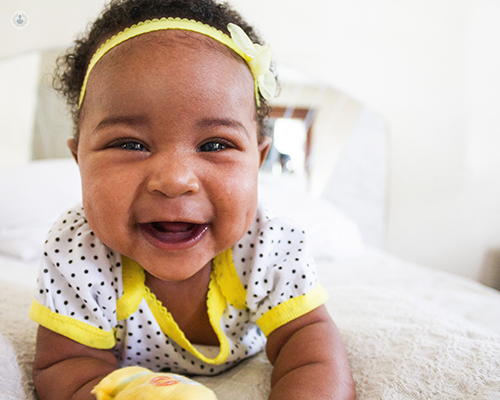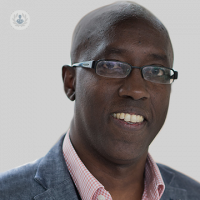How is infant acid reflux treated?
Autore:Gastroesophageal reflux happens due to too much relaxed muscle between the oesophagus (otherwise known as the gullet), and the stomach. As a consequence, the food the baby has taken will get mixed with acid from the stomach, and will then go up in the oesophagus causing pain and discomfort. Gastroesophageal reflux is more is more common in babies who have other problems such as those with cow's milk protein allergy, with cerebral palsy, or those babies that have problems with the lower gullet. Gastroesophageal reflux happens in one in two babies, and can develop into a disease leading to poor weight-gain, extreme vomiting and poor growth. Leading consultant paediatrician, Dr Dieudonne Birahinduka, explains how to recognize reflux in your baby, and how it can be treated.

How do you know if you’re baby has gastroesophageal reflux?
We know that baby has got gastroesophageal reflux by looking at the baby's behaviour, particularly after feeds. When the baby regurgitates the milk they have taken, the milk may smell acidic. The behavior of a baby with colic is completely different, as the baby will often draw up their legs, scream and then stop, whereas gastroesophageal reflux is more continuous.
The diagnosis of a gastroesophageal reflux is straightforward for paediatricians. It's based on pattern recognition from the baby’s behaviour during feeds and after feeds.
However, in some cases a pH study is needed which involves putting a probe in the gullet and measuring the degree of acidity. This demonstrates that the acid has gone from the stomach into the oesophagus. In very rare cases, an endoscopy or barium studies may be required, but the majority of babies with gastroesophageal reflux are diagnosed by observation.
What causes gastroesophageal reflux in babies?
We know that reflux is very common in babies because they are very young and haven’t developed the muscles in the oesophagus yet. With age the muscles become stronger and there shouldn’t be any milk going from the stomach into the gullet.
How is reflux managed in a baby?
The majority of babies with gastroesophageal reflux do not need treatment. The management of the condition is mainly making sure that we minimise the chance of the milk going from the stomach into the oesophagus. This can be done by making sure that the baby is upright.
The other step of management without medication would be to make sure that the milk is thickened. That again will decrease the chance of milk going from the stomach to the gullet as it is less liquid.
In some babies, we recommend that on top of positioning and thickening the milk, the baby should reduce the amount of milk taken. So, for example, the volume they are getting every three hours is reduced to two hours. This means that as the volume is low, the content in the stomach is lower than what the stomach can hold. As a consequence, the milk will not go back into the stomach.
In rare cases, then we may need to give the baby some medication. The medication given for gastroesophageal reflux begins with a simple one: Gaviscon, which is mainly to improve the lining of the stomach.
If this does not work, then we have to think about giving medication to reduce acidity in the stomach. In those cases, we give Ranitidine, or Omeprazole in some cases. This works by reducing the amount of harm caused by the acidic reflux.
If you are concerned about gastroesophageal reflux in your baby, you can make an appointment with a consultant paediatrician.



